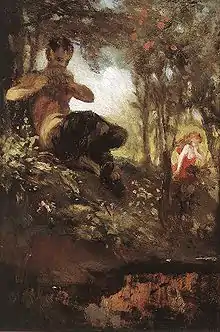faun
See also: Faun
English
Etymology
From Middle English fawn, from Latin Faunus.
Pronunciation
- (UK) IPA(key): /fɔːn/
Audio (Southern England) (file)
- (US) IPA(key): /fɔn/
- (cot–caught merger) IPA(key): /fɑn/
- Homophone: fawn
- Rhymes: -ɔːn
Noun
faun (plural fauns)
Translations
a mythical creature
|
Middle English
Polish

faun
Etymology
From Faun.
Pronunciation
- IPA(key): /fawn/
Audio (file) - Rhymes: -awn
- Syllabification: faun
- Homophone: Faun
Noun
faun m pers (related adjective fauni)
Declension
Romanian
This article is issued from Wiktionary. The text is licensed under Creative Commons - Attribution - Sharealike. Additional terms may apply for the media files.